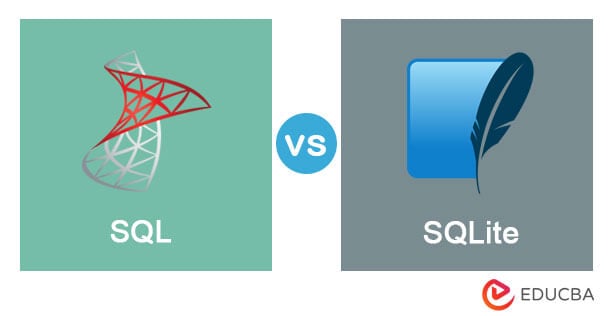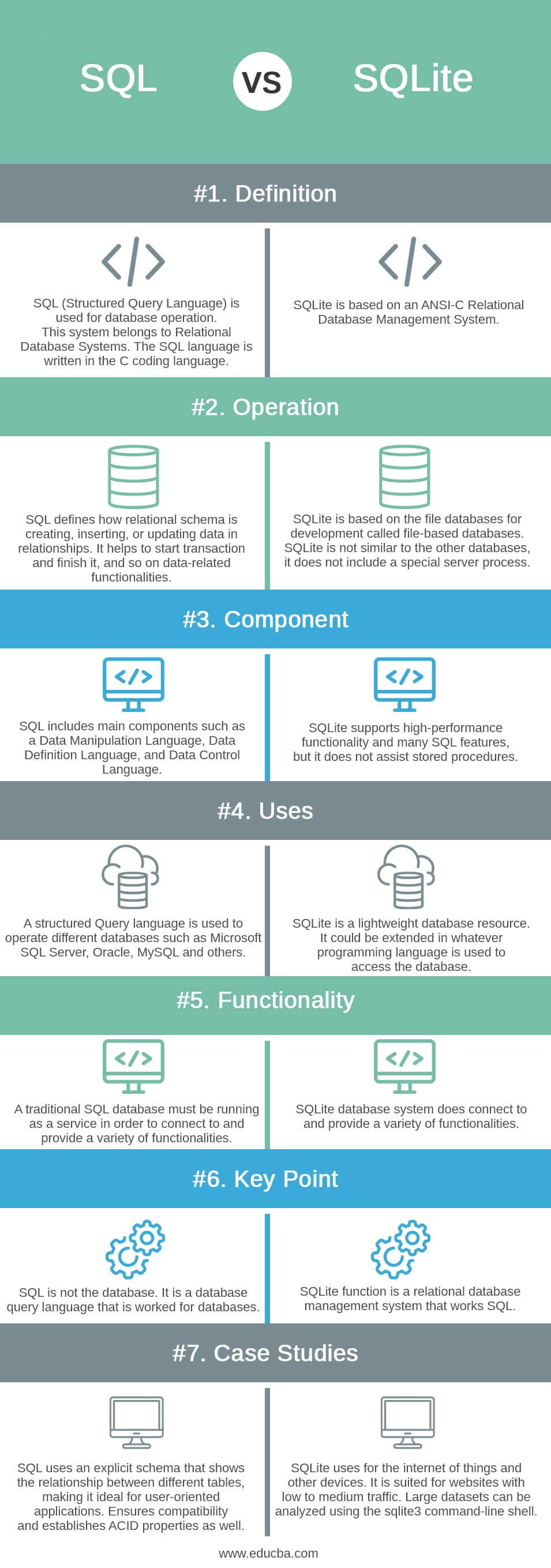Updated March 17, 2023
Difference between SQL vs SQLite
SQL vs SQLite is worked on the structure query language using several functionalities in the application. SQL and SQLite is a data or database management systems to handle application information and functionalities as per user requirements. SQL and SQLite is a techniques for the database management system to handle application data through a database.
The software library is an SQLite that enables the system to handle relational databases. SQL represents Structured Query Language. This program uses the database to interact with the database. The lightweight shortcut works great with SQLite and is lightweight with easy configuration, database management, and resource requirements. SQL statements are used to perform tasks such as data retrieval or updating data using a database.
What is SQL?
SQL is an abbreviation for Structured Query Language. SQL is capable of accessing, creating, and managing databases. SQL has been adopted as an American National Standards Institute standard. SQL is the primary database management language. A database is a table that contains rows and columns. It can also be used to search, update, and insert data. SQL also performs a variety of other tasks, such as database optimization and maintenance.
What is SQLite?
SQLite is a relational database management system software. SQLite is small in terms of setup, system administration, and resource requirements. SQLite has characteristics such as self-contained, serverless, zero-configuration, and so on. SQLite is the world’s most popular database engine. SQLite also supports several programming languages, including Python, Java, and others. SQLite also works with all mobile phones and most computers, and it is cross-platform and backward-compatible.
Head to Head Comparison of SQL vs SQLite (Infographics)
Below are the top 7 differences between SQL vs SQLite:
Key Differences Between SQL vs SQLite
Let us look at the key differences between SQL vs SQLite:
- The main distinction is that SQL is an abbreviation for Structured Query Language, which is the markup language used with databases. SQLite, on the other hand, is a portable database. Extensions to the programming language used to connect the database can be added.
- SQLite is an ANSI C-based relational database management system. While SQL is used to query relational database systems. C is the written language.
- SQLite supports many functions and has high performance, but it does not support stored procedures. SQL is made up of three parts: Data Definition Language (DDL), Data Manipulation Language (DML), and Data Control Language (DCL).
- SQLite architecture is file-based. SQLite differs from other SQL databases in that it does not have a separate server process, unlike most SQL databases.
- SQLite does not have a concept of user access control. Therefore SQL has fine-grained access rights by the standard.
- SQLite database is embedded in the client. While SQL is embedded in the server.
SQL Requirement
The following are the SQL functionalities and requirements used for web development.
- In the database, update the records.
- Submit queries to a database.
- Make a new database or table in an existing database.
- Permissions can be assigned to tables, activities, and views.
- Create database views and stored procedures.
- Delete data from a database.
SQLite Requirement
The following SQLite functionalities and requirements use for web development.
- As a fundamental element of Windows 10 and some other products. (Microsoft)
- SQLite is the SQL database engine used in its query product.
- Many native applications on server and desktop computers use it. Running on Mac OS X and iOS devices like the iPhone and iPod. Furthermore, SQLite is used in iTunes, even on non-Apple devices.
- The A350 XWB series flight program has been confirmed.
Comparison Table of SQL vs SQLite
The following table shows the comparison of SQL vs SQLite:
| Function | SQL | SQLite |
| Definition | SQL (Structured Query Language) is used for database operation. This system belongs to Relational Database Systems. The SQL language is written in the C coding language. | SQLite is based on an ANSI-C Relational Database Management System. |
| Operation | SQL defines how relational schema is creating, inserting, or updating data in relationships. It helps to start transaction and finish it, and so on data-related functionalities. | SQLite is based on the file databases for development called file-based databases. SQLite is not similar to the other databases, it does not include a special server process. |
| Component | SQL includes main components such as a Data Manipulation Language, Data Definition Language, and Data Control Language. | SQLite supports high-performance functionality and many SQL features, but it does not assist stored procedures. |
| Uses | A structured Query language is used to operate different databases such as Microsoft SQL Server, Oracle, MySQL, and others. | SQLite is a lightweight database resource. It could be extended in whatever programming language is used to access the database. |
| Functionality | A traditional SQL database must be running as a service in order to connect to and provide a variety of functionalities. | SQLite database system does connect to and provide a variety of functionalities. |
| Key Point | SQL is not the database. It is a database query language that is worked for databases. | SQLite function is a relational database management system that works SQL. |
| Case Studies
|
SQL uses an explicit schema that shows the relationship between different tables, making it ideal for user-oriented applications. Ensures compatibility and establishes ACID properties as well. | SQLite uses for the internet of things and other devices. It is suited for websites with low to medium traffic. Large datasets can be analyzed using the sqlite3 command-line shell. |
Purpose of SQL
The following are some purposes fulfilled after using SQL in web applications.
- Several data views are available
- The language is interactive
- Source code
- Simple to learn and comprehend
- Major DBMS system vendors use it
- A highly sought-after skill
- Little coding knowledge is required
- Quick query processing
Purpose of SQLite
The following are some purposes fulfilled after using SQLite in web applications.
- Better performance
- Accessibility
- Portability
- Application cost and complexity have been reduced
- Reliability
Conclusion
SQL and SQLite are both database-related functions for different kinds of applications. It is a database-structured query and management system to develop multiple user-friendly applications with different features.
Recommended Articles
This is a guide to SQL vs SQLite. Here we discuss SQL vs SQLite key differences with infographics and comparison table. You can also go through our other suggested articles to learn more –




